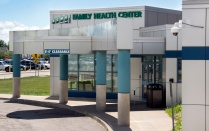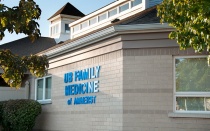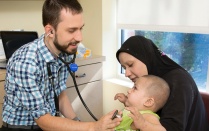Inpatient Surgery
You’ll gain ample procedural experience and work with skilled surgeons throughout this rotation.
You’ll round with surgical residents and faculty in a suburban hospital, where you’ll serve as a first or second operating room assistant.
You’ll learn aseptic techniques, basic surgical techniques—such as wound irrigation and closure—the principles underlying interoperative management and how to evaluate patients with emergent surgical conditions.
Procedures Learned
During this rotation, you’ll learn how to perform:
- arterial punctures
- abscess incisions and drainage
- IV insertions
- lipoma resections
- NG tube insertions
- simple skin excisions
- urinary bladder catheterization
- venipuncture
- wound debridement
Conditions Seen
You’ll learn how to diagnose and treat patients with:
- aortic aneurysm
- anorectal lesions
- bowel obstruction
- breast disease
- diverticular disease
- gangrene
- GI tumors
- gallbladder disease
- lung masses
- head and neck masses
- hernias
- inflammatory bowel disease
- intra-abdominal emergencies
- peripheral vascular disease
- pneumothorax and hemothorax
- thyroid nodules
- traumatic wounds
- venous stasis, including ulcers
You’ll learn how to recognize and manage postoperative complications, including:
- atelectasis
- DVT/PE
- hematoma
- infections
- wound complications
You’ll also learn how to recognize and manage cardiac, cerebral, peritoneal and psychiatric complications.
Clinical Site
Year Taken
PGY-1
Length of Rotation
2 weeks








